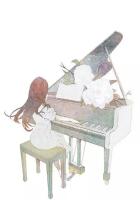`Because I wished to destroy it,' I answered, with an asperity it is useless now to lament.
`Oh, very good!' was the reply; `if you don't value me, I must turn to somebody that will.'
I thought it was partly in jest--a half-playful mixture of mock resignation and pretended indifference; but immediately he resumed his place beside Miss Wilmot, and from that hour to this--during all that evening, and all the next day, and the next, and the next, and all this morning (the 22nd), he has never given me one kind word or one pleasant look-never spoken to me, but from pure necessity--never glanced towards me, but with a cold, un friendly look I thought him quite incapable of assuming.
My aunt observes the change, and though she has not enquired the cause or made any remark to me on the subject, I see it gives her pleasure.
Miss Wilmot observes it too, and triumphantly ascribes it to her own superior charms and blandishments; but I am truly miserable--more so than I like to acknowledge to my self. Pride refuses to aid me. It has brought me into the scrape, and will not help me out of it.
He meant no harm--it was only his joyous, playful spirit; and I, by my acrimonious resentment--so serious, so disproportioned to the offence--have so wound his feelings--so deeply offended him, that I fear he will never forgive me--and all for a mere jest! He thinks I dislike him,--and he must continue to think so. I must lose him for ever; and Annabella may win him, and triumph as she will.
But it is not my loss, nor her triumph that I deplore so greatly as the wreck of my fond hopes for his advantage, and her un worthiness of his affection, and the injury he will do himself by trusting his happiness to her. She does not love him: she thinks only of herself. She cannot appreciate the good that is in him: she will neither see it, nor value it, nor cherish it. She will neither deplore his faults nor attempt their amendment, but rather aggravate them by her own. And I doubt whether she will not deceive him after all: I see she is playing double between him and Lord Lowborough, and while she amuses herself with the lively Huntingdon, she tries her utmost to enslave his moody friend; and should she succeed in bringing both to her feet, the fascinating commoner will have but little chance against the lordly peer. If he observes her artful by-play, it gives him no uneasiness, but rather adds new zest to his diversion by opposing a stimulating check to his otherwise too easy conquest.
Messrs Wilmot and Boarham have severally taken occasion by his neglect of me to renew their advances; and if I were like Annabella and some others, I should take advantage of their per severance to endeavour to pique him into a revival of affection; but, justice and honesty apart, I could not bear to do it; I am annoyed enough by their present persecutions without encouraging them farther;--and even if I did, it would have precious little effect upon him. He sees me suffering under the con descending attentions and prosaic discourses of the one, and the repulsive obtrusions of the other, without so much as a shadow of commiseration for me, or resentment against my tormentors. He never could have loved me, or he would not have resigned me so willingly, and he would not go on talking to everybody else so cheerfully as he does--laughing and jesting with Lord Low borough and my uncle, teasing Milicent Hargrave, and flirting with Annabella Wilmot--as if nothing were on his mind. Oh, why can't I hate him? I must be infatuated, or I should scorn to regret him as I do! But I must rally all the powers I have remaining, and try to tear him from my heart. There goes the dinner bell--and here comes my aunt to scold me for sitting here at my desk all day, instead of staying with the company--I wish the company were--gone.















